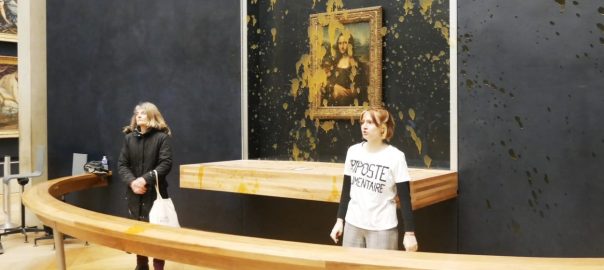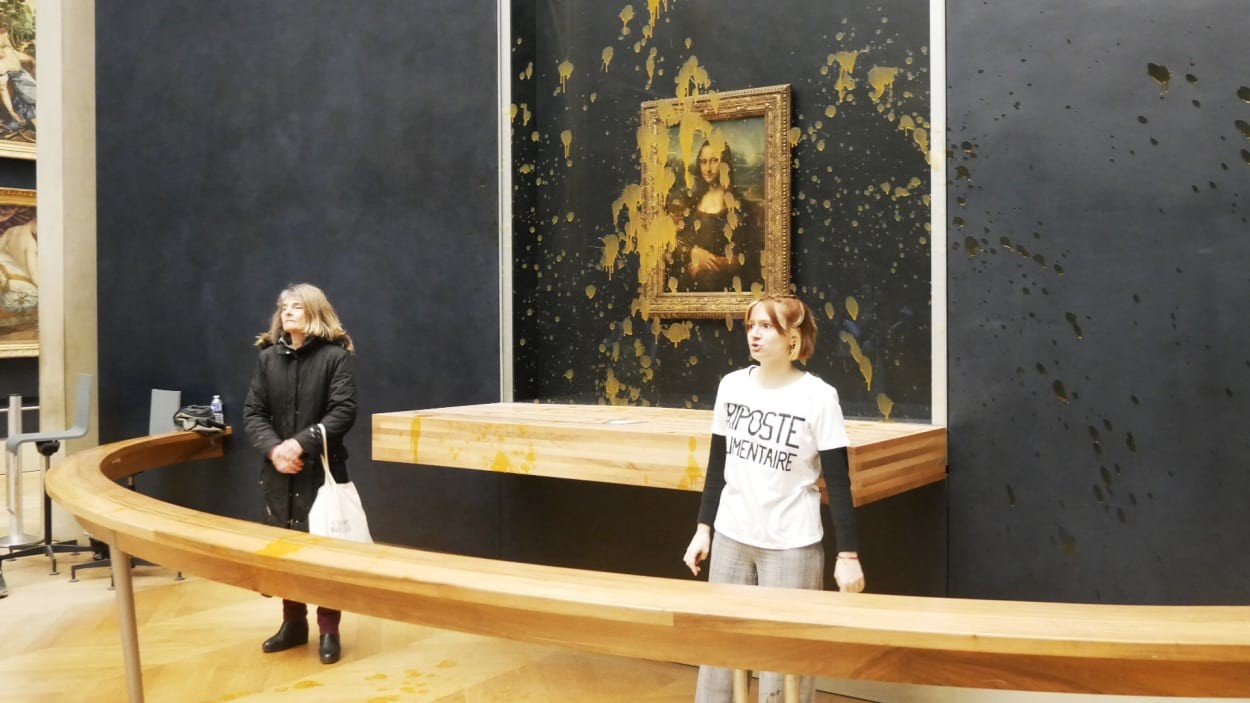How do you demonstrate solidarity with farmers suffering from the impact of climate change and a global economy? If the headlines are any indication, you hurl hot soup at the Mona Lisa.
Could there be there a morsel of method in the activists’ menu of madness? To find out, let’s contemplate why anyone might reasonably consider Mona Lisa an agent for social evolution.
If you haven’t seen Leonardo’s timeless masterpiece, move her to the top of your bucket list. It was nearly 40 years ago that I entered the Salon Carré, doubtful that the lady of legend could live up to her reputation.
Indeed, she did. Our eyes met, and I instantly fell under her spell. La Gioconda is the ultimate woman of mystery, gazing across the centuries, telling a story with her eyes that echoes across time and space.
Sadly, there are many who don’t hear the story she tells, for not everyone understands her language of silent repose. In my book, Proverbial Beauty, I write:
In every way, her simplicity enhances the air of mystery. She does not have to bare her flesh to attract our attention, does not have to wink or lick her lips to excite our imagination, does not need a pouty mouth to remind us of her femininity. Her modesty, contrary to all the assumptions of our time, is her most alluring quality.
In truth, she is even more mysterious than she herself reveals. X-rays have revealed three distinct images of La Gioconda beneath the picture that we see.
Mona Lisa is indeed a complicated lady, with layers and nuances we can scarcely imagine. And the relevance of her mysterious attraction reveals itself in the most recent entry into the Ethical Lexicon:
Pentimento (pen·?ti·?men·?to/ pen-tuh-men-toh) noun
The presence or emergence of earlier images, forms, or strokes that have been changed and painted over.
We all have past selves and alter egos lurking beneath our surface personalities, don’t we? The parts we play on the stage of life change from one act to the next. And that’s a good thing. We don’t want to be held prisoner to our character flaws or past traumas. Neither do we want to stagnate and rest on (March 07, 2024)’s glories. But despite our growth and maturation, even as we leave the past behind we can never completely escape it. Nor should we try to.
Greatness is almost always the product of overcoming obstacles. Margaret Thatcher struggled through extensive voice coaching to lower her voice before ascending to her position as Britain’s longest serving Prime Minister. Steve Jobs and Jack Dorsey were ousted from Apple and Twitter respectively before they triumphantly returned years later. Struggle and failure are the best mentors to prepare us for future success.
And success takes different forms. Michael Jordan walked away from a brilliant basketball career to pursue his dream of playing major league baseball. He never made it out of the minors, but he returned to the court with a settled heart and an enhanced focus he might never have achieved had he not made the effort. We may never escape the ghosts of our past selves, but we don’t need to be haunted by them.
Every time you challenge yourself, or challenge the status quo, you may suffer defeats or blows to your self-image that cause pain and leave open wounds. Those kinds of indignities don’t leave physical scars, but they become part of the canvas on which you illustrate each chapter of your life, rendering one story over another again and again. Inevitably, the unseen phase of each iteration makes itself known and recognized in the person you become.
You need not trumpet your successes or lament your defeats. Each concealed layer influences the way you carry yourself, revealing the extent to which your experiences have shaped who you are and continuously determining the impact your words and actions will have on others.
So what are we to say of the high-minded individuals who hoped to save the world by defacing Mona Lisa? It’s disquieting to consider that they may not have been completely misguided. After all, in our world of abundance, where so many yet suffer the indignity of want, is there not something odious about indulging our senses in celebration of superficial beauty? Adding a layer of ugliness could seem an appropriate stratagem for empathizing with human anguish.
But, no, they had it exactly backward. The way to combat the dysfunction of society is not by defacing beauty but by creating more of it, through the brushstrokes of our words and actions that contribute to a more harmonious world.
When we challenge ourselves to aim higher, when we treat our fellow human beings with greater respect, act more charitably, and discipline ourselves to set a better ethical example for those around us, then the pentimento of past migrations brings light to our present and our future.
We can do this in our work, when we contribute to a more civil, collaborative, and aspirational business environment. We can do it in our schools, in our politics, in our neighborhoods, and in our homes. We can do it quietly, without fanfare, without seeking attention for ourselves or worrying about who gets credit for making the world a better place.
This is the secret message of Mona Lisa. She is the paradigm of modesty, redirecting attention to internal essence by deflecting attention away from outer form, reminding us that, like the structure of the atom, like the machinery of the body, and like the fabric of the universe, there are no limits to the ways in which we can make our life’s work a true masterpiece.
(13)










